
-
Find the right food for your petTake this quiz to see which food may be the best for your furry friend.Find the right food for your petTake this quiz to see which food may be the best for your furry friend.Featured products
 Puppy Food
Puppy FoodHill's Science Plan Puppy Multipack Wet Dog Food with Chicken & Beef are complete premium pet foods for growing puppies from weaning until 1 year old and for pregnant and nursing dogs. Your puppy will love these deliciously smooth and savoury minced loaves, formulated for balanced nutrition and overall health.
Shop Now Adult Wet Dog Food with Beef
Adult Wet Dog Food with BeefHill's Science Plan Adult Multipack Wet Dog Food with Chicken, Beef & Turkey are complete premium pet foods for adult dogs from 1 year. Your dog will love these deliciously smooth and savoury minced loaves, formulated for balanced nutrition and overall health.
Shop Now Mature Adult Dog Food
Mature Adult Dog FoodHill's Science Plan Mature Adult Multipack Wet Dog Food with Chicken & Beef are complete premium pet foods for mature adult dogs from 7 years. Your dog will love these deliciously smooth and savoury minced loaves, formulated to deliver the appropriate amount of energy to support the needs of adult dogs.
Shop NowFeatured products Hairball & Perfect Coat Adult Dry Cat Food with Chicken
Hairball & Perfect Coat Adult Dry Cat Food with ChickenHill's Science Plan Hairball & Perfect Coat Adult Cat Food with Chicken is formulated to effectively help avoid hairball formation in adult cats while promoting a beautiful coat. Thanks to its mix of essential omega-6 fatty acids, this food benefits the cat's skin and fur, keeping them healthy and shiny. Our Advanced Fibre Technology helps reduce hairballs by naturally promoting their passage through the gut. This food is formulated with high-quality protein for a perfectly balanced, great-tasting recipe.
Shop Now Sterilised Adult Cat Food
Sterilised Adult Cat FoodHill's Science Plan Adult Sterilised Cat Dry Food with Salmon is specially formulated with ActivBiome+ Multi-Benefit Technology. It is a precisely balanced nutrition, tailored to meet the needs of sterilised cats, to help keep them lean & healthy.
Shop Now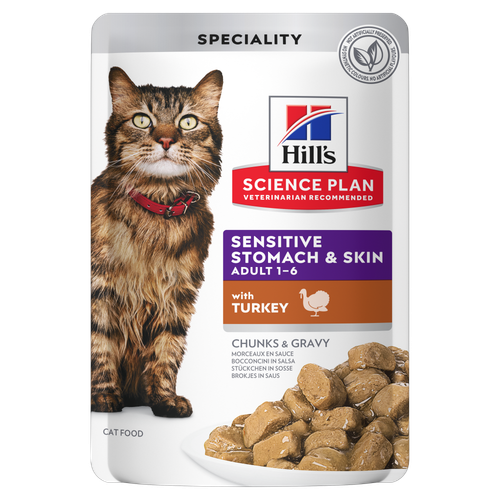 Sensitive Stomach & Skin Adult Cat Food
Sensitive Stomach & Skin Adult Cat FoodHill's Science Plan Sensitive Stomach & Skin Adult Wet Cat Food with Turkey is a complete pet food for adult cats, aged 1–6 years. This highly digestible wet food comes in a pouch and supports healthy digestion, as well as nourishes skin and promotes a thick and lustrous coat.
Shop Now -
Dog
- Dog Tips & Articles
-
Health Category
- Weight
- Food & Environmental Sensitivities
- Urinary
- Digestive
- Joint
- Kidney
-
Life Stage
- Puppy Nutrition
- Adult Nutrition
- Senior Nutrition
Cat- Cat Tips & Articles
-
Health Category
- Weight
- Skin & Food Sensitivities
- Urinary
- Digestive
- Kidney
-
Life Stage
- Kitten Nutrition
- Adult Nutrition
Featured articles The Right Diet For Your Pet
The Right Diet For Your PetIn people, the right diet is very important. If you are eating the wrong way for your metabolism, activity level, age and lifestyle you could end up with health issues.
Read More Show some love with wet foods: a great choice for pets with health issues
Show some love with wet foods: a great choice for pets with health issuesShow some love with wet foods: a great choice for pets with health issues.
Read More The Incredible Science Behind Your Pet's Microbiome
The Incredible Science Behind Your Pet's MicrobiomeLearn what your pet's microbiome is, how it contributes to your pet's gut and overall health, and why nutrition is important in maintaining healthy microbiomes.
Read More -


Much like us humans, cats need special care when it comes to hot, sunny weather. Sunburn, heat exhaustion and dehydration can affect indoor as well as outdoor cats, so make sure you and your cat are fully prepared for the summer heat.
Cats love the warmth but the hotter it gets, the more likely they are to suffer from heat-related illnesses. There are lots of preventative measures you can take though to help keep your cat safe and healthy during the summer months.
Avoiding Sunburn
White cats or cats with white ears and faces are particularly susceptible to sunburn. Apply high factor sun cream liberally to their ears and faces, as you can't trust them to stay in the shade! When the sun is at its strongest and you're able to, it's also advisable to keep your cat indoors to protect against serious sun damage.
Avoiding Heatstroke
When it's extremely hot, you can help your cat avoid sunstroke by keeping her indoors in a cool room. Rubbing her down with a damp towel will also help, as will immersing her feet in a tub of cool water and wrapping a cold compress under your cat's neck. Try wrapping a plastic bag of frozen peas in a towel and placing it in her bed for a cool spot to lie in. The peas will naturally rearrange themselves to fit her contours, providing a 'custom spa' for cooling off.
If you do suspect your cat has heatstroke, look out for these early symptoms:
- Panting
- Anxiety, possibly demonstrated by pacing
- Increased heartbeat
- Respiratory distress or hyperventilation (breeds with flat noses may exhibit this earlier because of compromised airways)
- Dark red gums
- Lethargy
- Increased internal body temperature (your cat's internal temperature should be between 100.5 and 101.5 degrees Fahrenheit. A body temperature in excess of 104 degrees is a definite warning sign
If your cat shows any of the signs above, cool her down as quickly as possible by immersing her in cool water and then wrapping her in wet towels. Then take her immediately to the vet as, in its extreme cases, heatstroke can be fatal.


Tasty Tips
Avoiding Dehydration
Dehydration can seriously affect cats so make sure you leave plenty of water in several locations around the house once the weather heats up. Also, remember to keep replenishing it whenever you see it getting low. Some cats drink less when the weather gets hot but you can encourage them to drink more by adding an ice cube to their bowls and keeping the water fresh and clean. Gently coaxing them by taking their water and placing it beside them may also do the trick.
Providing Shelter Inside
Inside cats need to have plenty of shelter from the blazing sun, so if you tend to leave the blinds fully open all day, it may be wise to think again. The sun's rays can quickly heat up a room leaving cats with little shelter during daylight hours, so if you must leave some of the shades open, opt for just one room and leave the remainder of the shades shut. This will keep the temperature down and give your cat some much-needed shade.


One of our staff authors prepared this article for you
Related products

Hill's Science Plan Adult Sterilised Cat Dry Food with Salmon is specially formulated with ActivBiome+ Multi-Benefit Technology. It is a precisely balanced nutrition, tailored to meet the needs of sterilised cats, to help keep them lean & healthy.

Hill's Science Plan Hairball & Perfect Coat Adult Cat Food with Chicken is formulated to effectively help avoid hairball formation in adult cats while promoting a beautiful coat. Thanks to its mix of essential omega-6 fatty acids, this food benefits the cat's skin and fur, keeping them healthy and shiny. Our Advanced Fibre Technology helps reduce hairballs by naturally promoting their passage through the gut. This food is formulated with high-quality protein for a perfectly balanced, great-tasting recipe.

Hill's Science Plan Sensitive Stomach & Skin Adult Wet Cat Food with Turkey is a complete pet food for adult cats, aged 1–6 years. This highly digestible wet food comes in a pouch and supports healthy digestion, as well as nourishes skin and promotes a thick and lustrous coat.
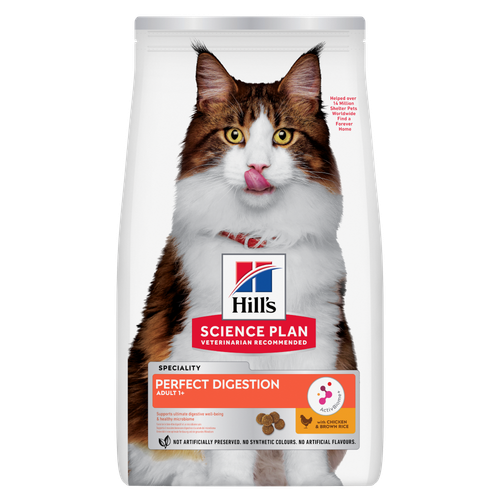
Hill's Science Plan Perfect Digestion Cat Food with Chicken & Brown Rice nourishes your cat's unique microbiome and helps them reach their full potential.
Related articles

There are three common ways to feed a cat. Each way has its advantages and disadvantages.
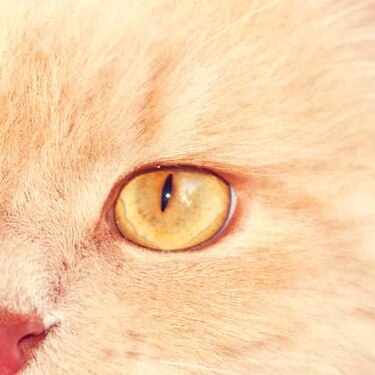
Chocolate is known to be poisonous for dogs, but it can also be toxic for cats. Learn why chocolate is bad for cats & what to do if she's eaten it.
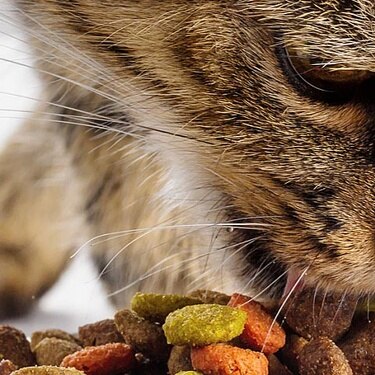
From essential vitamins & minerals to different types of meat, learn what to look for when choosing the best cat food for your feline.
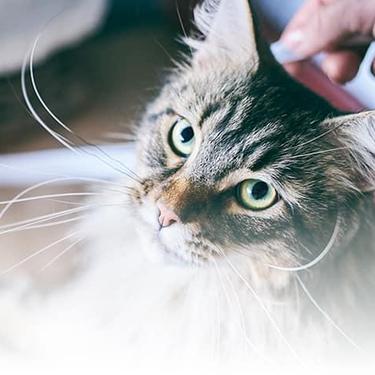
Learn how to make homemade cat treats that are healthy for your pet with this recipe from Hills Pet Nutrition.

Put your cat on a diet without them knowing
Our low calorie formula helps you control your cat's weight. It's packed with high-quality protein for building lean muscles, and made with purposeful ingredients for a flavourful, nutritious meal. Clinically proven antioxidants, Vitamin C+E, help promote a healthy immune system.
Put your cat on a diet without them knowing
Our low calorie formula helps you control your cat's weight. It's packed with high-quality protein for building lean muscles, and made with purposeful ingredients for a flavourful, nutritious meal. Clinically proven antioxidants, Vitamin C+E, help promote a healthy immune system.

